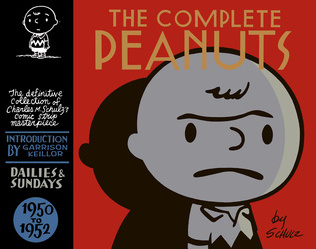

Charles M. Schulz · 343 pages
Rating: (5.5K votes)
“Patty: I'll be the good guy.
Shermy: I'll be the bad guy.
Patty: What are you going to be, Charlie Brown?
Charlie Brown: I'll be sort of in-between; I'll be a hypocrite!”
― Charles M. Schulz, quote from The Complete Peanuts, Vol. 1: 1950-1952
“My last penny! I think I'll squander it on myself. I never feel badly about spending money my dad has earned honestly! I can't decide whether I should buy a balloon or a gumball. A gumball would taste mighty good, but a balloon would be a lot more fun... I'll take a balloon! Sooner or later in life a person has to learn to make decisions! (Sees someone with a different color balloon) Gee, I wish I'd bought a RED balloon.”
― Charles M. Schulz, quote from The Complete Peanuts, Vol. 1: 1950-1952
“Whenever the sun is shining, I feel obligated to play outside!”
― Charles M. Schulz, quote from The Complete Peanuts, Vol. 1: 1950-1952
“Charlie Brown: A penny! Rats! Why couldn't I have found a nickel? What good is a penny these days? Why do things like that always happen to me?! *walks off frustrated*
Lucy: Gee, he found a penny! Why don't things like that ever happen to me?”
― Charles M. Schulz, quote from The Complete Peanuts, Vol. 1: 1950-1952
“Shermy: Men are better than women!
Patty: They are not!!
Shermy: Washington was a man! Jefferson was a man! Lincoln was a man!
Patty: Your mother is a woman!!
Shermy: You got me!”
― Charles M. Schulz, quote from The Complete Peanuts, Vol. 1: 1950-1952

“The point of freewriting is to get past the voice inside your head that tells you your ideas aren't good enough, your words aren't good enough, you're no writer and so forth.”
― M. Molly Backes, quote from The Princesses of Iowa
“And it was too late. No one wants to believe something is too late, but it is always becoming too late, and then it is.”
― Elizabeth Strout, quote from The Burgess Boys
“Glasgow? Isn’t that in Sweden?” Dody was asking. He shook his head. “Scotland.” “Oh, yes, Scotland. Why, you must know Sean Connery then? He’s Scottish. Or is he German?” Des bit back a smile. “He is Scottish, but no, I never had the pleasure.” “Really? That’s surprising. Sweden is such a small country.” “Scotland.” “What? Oh, yes. Scotland. Why did you move from there, dear? Was it because of the potatoes?” She patted his hand sympathetically. “The potatoes?” “Potato famine was in Ireland, Mom,” Jasper said, banging the oven door shut. “In the 1840s,” I added, wanting to show off a little of my vast wealth of useless, esoteric facts.”
― Tracy Brogan, quote from Crazy Little Thing
“There have been some saints, but they have been in small numbers, who have walked upon this sweet path to go to Jesus, because the Holy Ghost, faithful Spouse of Mary, by a singular grace disclosed it to them. Such were St. Ephrem, St. John Damascene, St. Bernard, St. Bernardine, St. Bonaventure, St. Francis de Sales, and others. But the rest of the saints, who are the greater number, although hall all had devotion to our Blessed Lady, nevertheless have either not at all, or at least very little, entered upon this way. That is why they have had to pass through ruder and more dangerous trials.”
― St. Louis de Montfort, quote from True Devotion to Mary
“Fact and fiction are different truths.”
― Patricia MacLachlan, quote from The Facts and Fictions of Minna Pratt
BookQuoters is a community of passionate readers who enjoy sharing the most meaningful, memorable and interesting quotes from great books. As the world communicates more and more via texts, memes and sound bytes, short but profound quotes from books have become more relevant and important. For some of us a quote becomes a mantra, a goal or a philosophy by which we live. For all of us, quotes are a great way to remember a book and to carry with us the author’s best ideas.
We thoughtfully gather quotes from our favorite books, both classic and current, and choose the ones that are most thought-provoking. Each quote represents a book that is interesting, well written and has potential to enhance the reader’s life. We also accept submissions from our visitors and will select the quotes we feel are most appealing to the BookQuoters community.
Founded in 2023, BookQuoters has quickly become a large and vibrant community of people who share an affinity for books. Books are seen by some as a throwback to a previous world; conversely, gleaning the main ideas of a book via a quote or a quick summary is typical of the Information Age but is a habit disdained by some diehard readers. We feel that we have the best of both worlds at BookQuoters; we read books cover-to-cover but offer you some of the highlights. We hope you’ll join us.